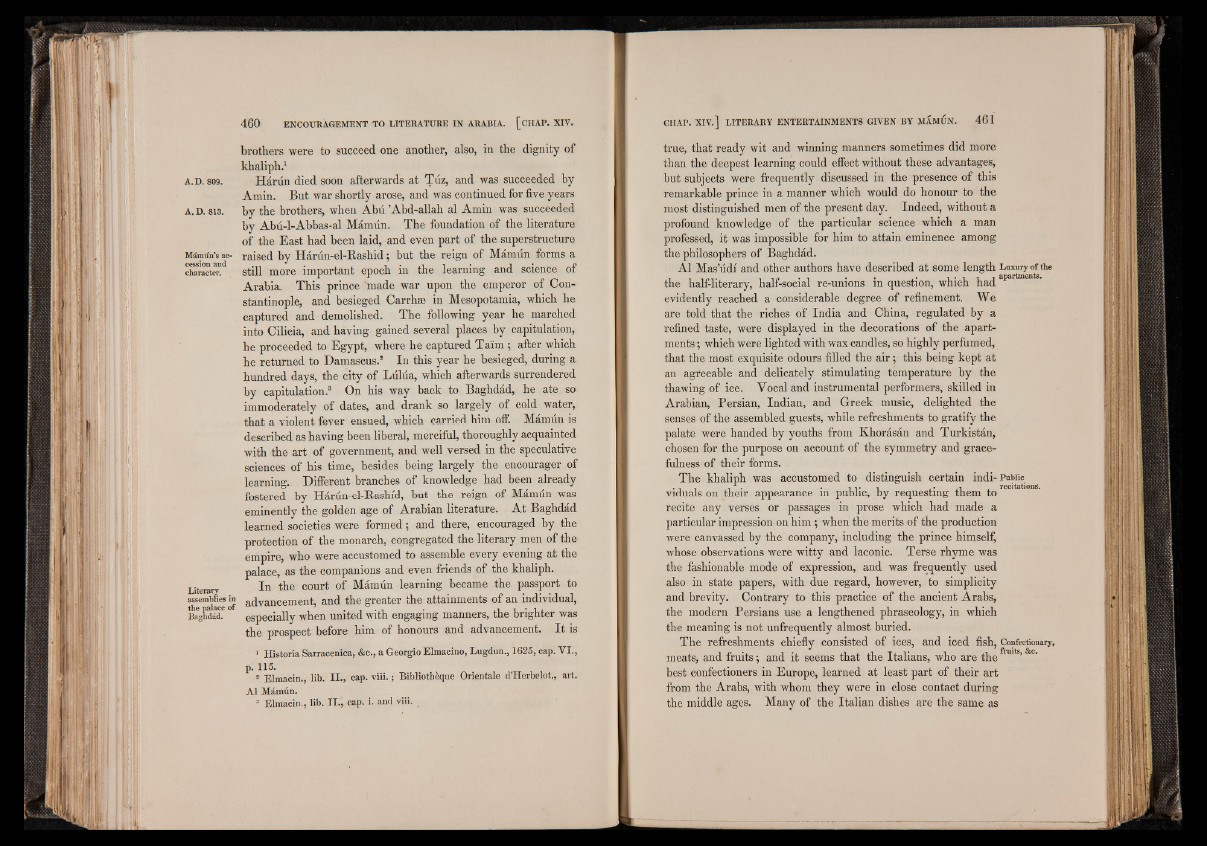
A. D. 813.
Mannings accession
and
character.
Literary
assemblies in
the palace of
Baghdád.
brothers were to succeed one another, also, in the dignity of
khaliph.1
Hárún died soon afterwards at Túz, and was succeeded by
Amin. But war shortly arose, and was continued for five years
by the brothers, when Abú ’Abd-allah al Amin was succeeded
by Abú-1-Abbas-al Mámún. The foundation of the literature
of the East had been laid, and even part of the superstructure
raised by Hárún-el-Bashid ; but the reign of Mámún forms a
still more important epoch in the learning and science of
Arabia. This prince made war upon the emperor of Constantinople,
and besieged Carrhæ in Mesopotamia, which he
captured and demolished. The following year he marched
into Cilicia, and having gained several places by capitulation,
he proceeded to Egypt, where he captured Taïm ; after which
he returned to Damascus.* In this year he besieged, during a
hundred days, the city of Lúlúa, which afterwards surrendered
by capitulation.3 On his way back to Baghdád, he ate so
immoderately of dates, and drank so largely of cold water,
that a violent fever ensued, which carried him off. Mámún is
described as having been liberal, merciful, thoroughly acquainted
with the art of government, and well versed in the speculative
sciences of his time, besides being largely the encourager of
learning. Different branches of knowledge had been already
fostered by Hárún-el-Rashíd, but the reign of Mámún was
eminently the golden age of Arabian literature. At Baghdad
learned societies were formed ; and there, encouraged by the
protection of the monarch, congregated the literary men of the
empire, who were accustomed to assemble every evening at the
palace, as the companions and even friends of the khaliph.
In the court of Mámún learning became the passport to
advancement, and the greater the attainments of an individual,
especially when united with engaging manners, the brighter was
the prospect before him of honours and advancement. It is
1 Historia Sarracénica, &c., a Georgio Elmacino, Lugdun., 1 6 2 5 , cap. V I.,
p . 1 1 5 .
a Elmacin., lib. I I ., cap. viii. ; Bibliothèque Orientale d’Herbelot., art.
A l Mámún.
3 Elmacin., lib. I I ., cap. i. and viii. ,
true, that ready wit and winning manners sometimes did more
than the deepest learning could effect without these advantages,
but subjects were frequently discussed in the presence of this
remarkable prince in a manner which would do honour to the
most distinguished men of the present day. Indeed, without a
profound knowledge of the particular science which a man
professed, it was impossible for him to attain eminence among
the philosophers of Baghdad.
Al Masudi and other authors have described at some length Luxury of the
n . . • i • i i j apartments. the half-literary, half-social re-unions in question, which had
evidently reached a considerable degree of refinement. We
are told that the riches of India and China, regulated by a
refined taste, were displayed in the decorations of the apartments
; which were lighted with wax candles, so highly perfumed,
that the most exquisite odours filled the air; this being kept at
an agreeable and delicately stimulating temperature by the
thawing of ice. Yocal and instrumental performers, skilled in
Arabian, Persian, Indian, and Greek music, delighted the
senses of the. assembled guests, while refreshments to gratify the
palate were handed by youths from Khorasan and Turkistan,
chosen for the purpose on account of the symmetry and gracefulness
of their forms.
The khaliph was accustomed to distinguish certain indi- Public
viduals on their appearance in public, by requesting them to
recite any verses or passages in prose which had made a
particular impression on him ; when the merits of the production
were canvassed by the company, including the prince himself,
whose observations were witty and laconic. Terse rhyme was
the fashionable mode of expression, and was frequently used
also in state papers, with due regard, however, to simplicity
and brevity. Contrary to this practice of the ancient Arabs,
the modern Persians use a lengthened phraseology, in which
the meaning is not unfrequently almost buried.
The refreshments chiefly consisted of ices, and iced fish, Confectionary,
meats, and fruits; and it seems that the Italians, who are the ’
best confectioners in Europe, learned at least part of their art
from the Arabs, with whom they were in close contact during
the middle ages. Many of the Italian dishes are the same as